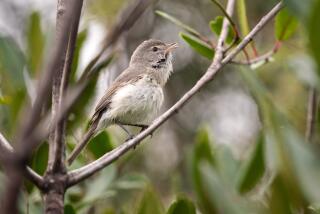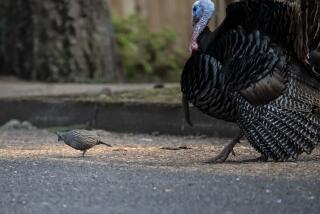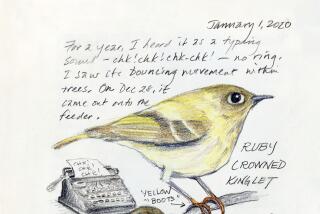With a Peacock Lady Hovering, Park Birds Have Little to Fear
- Share via
The other park visitors have gone home and Helia Buyck’s jumbo bag of peacock feed--popcorn with Lite Salt--is but a crumpled wad of plastic in her hand.
The crickets’ chorus has started, or is it only now that I am hearing what they have to say?
Striding purposefully toward the trees, the peacocks too are heralding the approaching darkness.
They stop at the tree trunks and peer at the branches above, their bodies silhouetted against the gauzy streams of sunshine before they jump to their roosts with a fanfare of ruffled feathers and coos.
*
Helia smiles, gently, mostly with her eyes. This is why she comes here every weekday, to feed and tuck her babies in, about 60 of them, and to do what she can to make them safe.
“It is very difficult to understand that people cannot love such beautiful animals,” she says, gazing toward the trees. Her French accent, even after 14 years in the United States, puts a curl on every word.
“These people, these people, who do not like them,” she says, pausing, searching for the right words. “They must be weird.”
Then a whisper of footsteps intrudes. Dried leaves swish on the ground. A peacock, his neck the iridescent blue of the male, hurries toward the trees now weighted with his brethren for the night.
“There is always one!” Helia scolds, looking past me toward the bird. “Like this one! What is he doing now, on the ground!”
The peacock glances momentarily toward us but doesn’t stop. He pops up onto a tree branch, just in time. Otherwise, Helia would have swooped him up and caged him for the night. There, blinded by the darkness, he would at least be safe.
If letting nature take its course means providing coyotes and raccoons with a peacock meal at Irvine Regional Park, then Helia Buyck will have no part. And she is appreciated around here for that, and for more.
Earlier this month, at a ceremony commemorating the 95th anniversary of the park, Helia was presented with a plaque that said as much, albeit in a formal tone.
She says the surprise honor was certainly a nice one, that she gave a little speech thanking this person and that, especially the park authorities who let her nurture the animals she loves.
But, then again, the park authorities were the ones who had nominated Helia for the award. She’s their friend, and unofficial employee, who brings her own food.
She’s been coming here for seven years, five days a week, after her work as a traveling medical sonographer is done. She lives in Oceanside but doesn’t mind the drive.
All this started with Be-Beep the rooster--named after the sound the Roadrunner cartoon character makes--whom Helia had donated to the zoo here because she was living in an apartment back then.
(Always a softie, Helia had accepted the baby Be-Beep from a little neighbor girl hoping to place him in a good home.)
Helia got rather attached to the rooster. She’d visit him in the zoo most every day, and then when a park ranger brought over a day-old peacock, the orphan Leo, she raised him, too. When he outgrew the home life, she brought him to the park.
“He was tame,” Helia says. “He was way too tame. He was not afraid of people and, of course, come springtime, he wanted to be with the girls. Then one day, he didn’t come back. Later, I found his feathers on the horse trail. I knew he had been taken by a coyote.”
Helia grows quiet now. There were other mistakes, too. She fitted her next group of orphans--12 little ones she raised at home and at cages built at the park--with bands on their legs.
But she allowed them to join the rest of the flock too soon. She found a pile of feathers, and a foot band, after that first night. She doesn’t band her orphans any more.
“It is too much heartbreak for me,” she says.
Oh, sure, Helia understands that the intensity of her love of peacocks sets her apart, that she is one of “them,” an animal person, wonderfully eccentric, someone who spends great chunks of her time caring for animals that others ignore. She is proud of that.
And most of these people are women, it seems. The pigeon lady, the turtle lady, the cat lady, the opossum lady. I’ve just talked to one who adores bats. No matter. They share a bond.
All abhor the arrogance of people.
“God has created the animals first, before the human beings, and then he gave them dominion over the animals,” Helia says.
“Unfortunately, too many people think that gives them the right to torture and abuse them, and that is not what God meant.”
*
So Helia, happily single at 55, does what she can.
If she sees children chasing after the birds--which she often does--she asks them to stop.
Once she stopped a group from bashing a peacock with a stick. Fishing line is also a big problem. The birds become entangled. Toe amputations have been the result.
The sky is dark now, the sun just a hint of a glow. Helia grows silent, then speaks softly, out of respect for the silence that surrounds.
“We live in a world that is so ugly, and here I am surrounded by beauty and nature,” she says. “I am very happy. I feel very blessed. I have a lot of friends, so I am really a blessed woman.”
Then as we are about to go, she walks toward the trees where her babies are roosting for the night, big lumpy shadows against the sky.
Helia whistles at them, and they coo in return. Good night.
More to Read
Sign up for The Wild
We’ll help you find the best places to hike, bike and run, as well as the perfect silent spots for meditation and yoga.
You may occasionally receive promotional content from the Los Angeles Times.






